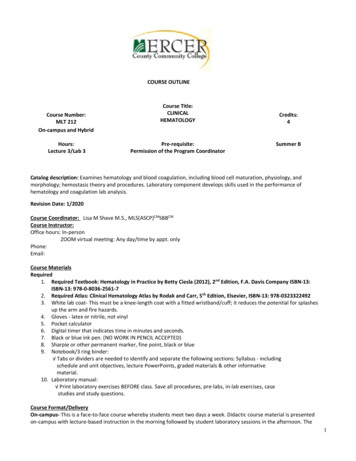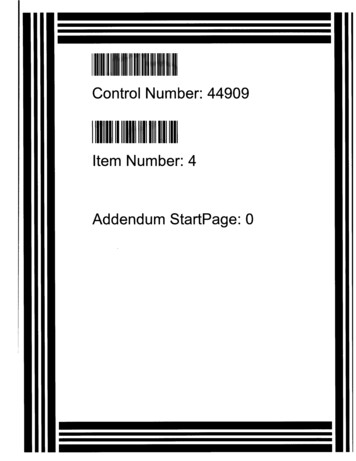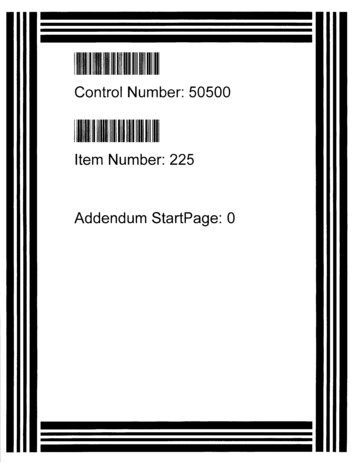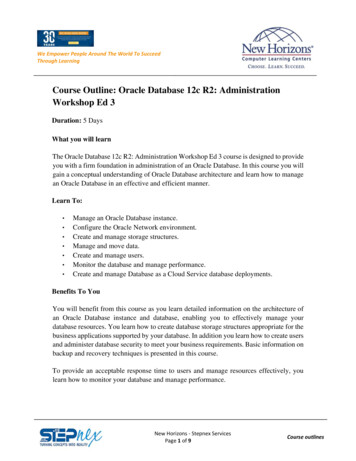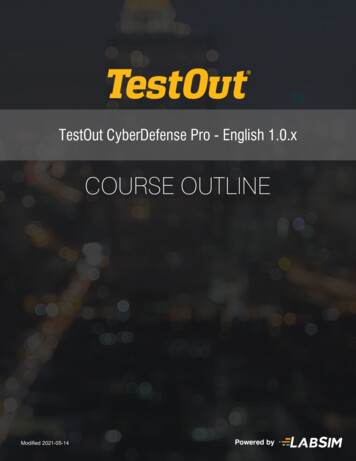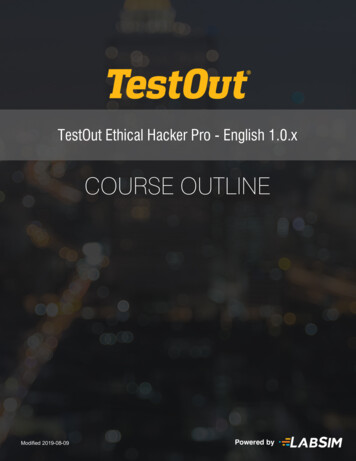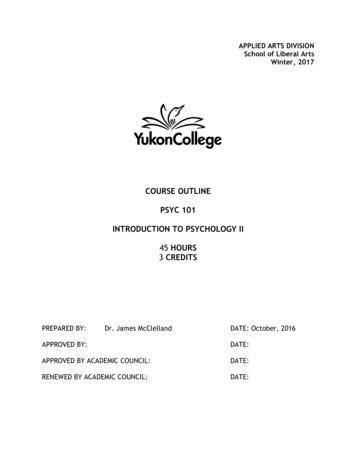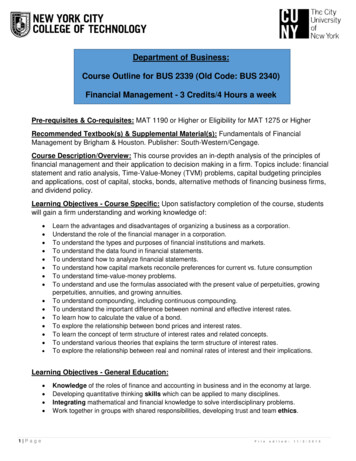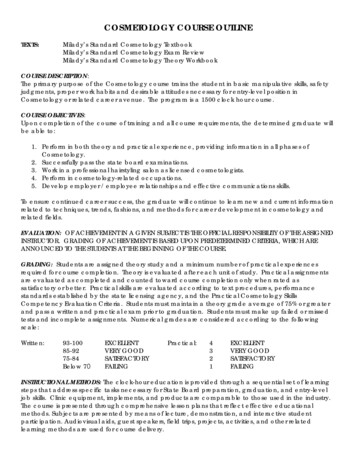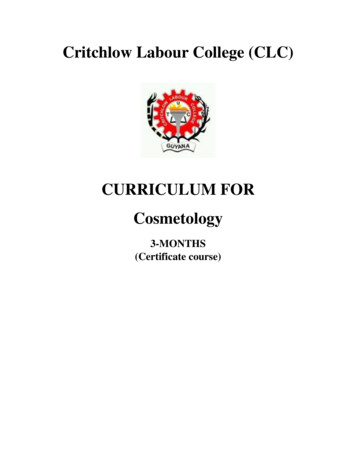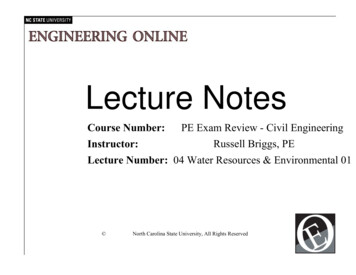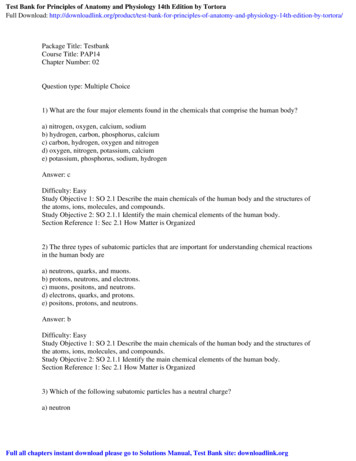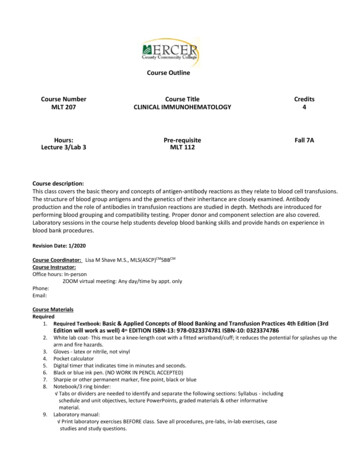
Transcription
Course OutlineCourse NumberMLT 207Course TitleCLINICAL IMMUNOHEMATOLOGYCredits4Hours:Lecture 3/Lab 3Pre-requisiteMLT 112Fall 7ACourse description:This class covers the basic theory and concepts of antigen-antibody reactions as they relate to blood cell transfusions.The structure of blood group antigens and the genetics of their inheritance are closely examined. Antibodyproduction and the role of antibodies in transfusion reactions are studied in depth. Methods are introduced forperforming blood grouping and compatibility testing. Proper donor and component selection are also covered.Laboratory sessions in the course help students develop blood banking skills and provide hands on experience inblood bank procedures.Revision Date: 1/2020Course Coordinator: Lisa M Shave M.S., MLS(ASCP)CMSBBCMCourse Instructor:Office hours: In-personZOOM virtual meeting: Any day/time by appt. onlyPhone:Email:Course MaterialsRequired1. Required Textbook: Basic & Applied Concepts of Blood Banking and Transfusion Practices 4th Edition (3rdEdition will work as well) 4th EDITION ISBN-13: 978-0323374781 ISBN-10: 03233747862.3.4.5.6.7.8.9.White lab coat- This must be a knee-length coat with a fitted wristband/cuff; it reduces the potential for splashes up thearm and fire hazards.Gloves - latex or nitrile, not vinylPocket calculatorDigital timer that indicates time in minutes and seconds.Black or blue ink pen. (NO WORK IN PENCIL ACCEPTED)Sharpie or other permanent marker, fine point, black or blueNotebook/3 ring binder: Tabs or dividers are needed to identify and separate the following sections: Syllabus - includingschedule and unit objectives, lecture PowerPoints, graded materials & other informativematerial.Laboratory manual: Print laboratory exercises BEFORE class. Save all procedures, pre-labs, in-lab exercises, casestudies and study questions.
Course Format/DeliveryOn-campus- This is a face-to-face course whereby students meet two days a week. Didactic course material is presentedon-campus with lecture-based instruction in the morning followed by student laboratory sessions in the afternoon. Thecourse requires a lot of outside proactive work by the student. The instructor will provide guidance as needed. Studentswill access and print out course materials from the course’s Blackboard shell. Assessment activities are provided as a meansof assisting students in determining their level of competence in given areas as well as to assist in reviewing forexaminations. Weekly homework assignments will be required to enhance the student’s learning experience.Hybrid- This is a web-blended course whereby didactic course material is presented mainly online and student laboratorysessions are held weekly on the college campus. The course requires a lot of outside proactive work by the student. Theinstructor will provide guidance as needed. Students will access and print out course materials from the course’sBlackboard shell. Lab manuals are available for purchase the MCCC bookstore. Assessment activities are provided as ameans of assisting students in determining their level of competence in given areas as well as to assist in reviewing forexaminations. Assignments will be posted to enhance the student’s learning experience. Online discussion boards aremandatory; they are an essential tool for communication between peers and between students and instructors. Thestudent must take all major examinations (midterm and final) at an approved testing center.Technology ExpectationsStudents must have access to a computer with Internet connection, either at home, the library or MCCC campus. A 56Kmodem connection is recommended. Mozilla Firefox 3.6 browser is recommended, although Internet Explorer 7 and 8,Google Chrome and Safari 4.3.2 can be used. AOL is NOT supported by Blackboard. Cookies, JavaScript, Active Scripting andPop-up Windows must be enabled on the browser you use.ScheduleLecture Meeting Days There are scheduled face-to-face classes.Lecture Modes of Instruction Blackboard Learning Management System (see below for access directions) Lecture PowerPoints Internet resourcesoMediaLab, Inc (click for link)oKahootoOthers (Youtube, etc.)Laboratory Room/Time MS320 on Tuesdays and Thursdays (OC) and Wednesdays (Hybrid). Face-to-facelaboratory sessions will take place in the afternoon on meeting days in Room MS320, during the semester and willbe mandatory. All laboratory procedures MUST be PRINTED for each laboratory session. Students must abide byall policies contained in the college and program handbook & Lab Safety Manual.Time CommitmentAccording to Flint’s “Surviving College,” (https://www.umflint.edu/advising/surviving college.htm) you should budget yourtime per week for this four hour credit course as follows:1. PowerPoints/Readings assigned: 3 to 6 hours2. Assignments: 3 to 6 hours3. Time for review and test preparation: 3 hours4. Total study time per week 9 to 12 hours PER WEEKBlackboard On-Line SystemThis course will be conducted via the computer on-line Blackboard learning system. Online tutorial sessions are available to helpyou understand how to use Blackboard. The dates/times can be found on the MCCC website by clicking here. Students may usetheir home computers OR may access all materials using any public computer or electronic device. Students are strongly advisedNOT to use iPads, tablets or cell phones to take course quizzes/examinations.-Logging in to Blackboard2
Course Competencies/GoalsUpon completion of this course the student will be able to:1.Exhibit knowledge of safety and quality control used in a blood bank laboratory. (G3, GB)2. Describe the function of the human immune system as it applies to the principles of immunology, serology and bloodbank testing. (G1,3, GA,B)3.Apply the biological concepts of genetics and immunology to antigen and antibody development in ABO, Rh, andother blood group systems. (G3, GB)4.Demonstrate knowledge and the application of principles of serological testing in pre-transfusion and compatibilitytesting and in the selection of component therapy as they relate to current blood bank practices. (G3, GB)5.Incorporate knowledge of Hemolytic Disease of the Fetus/Newborn in the evaluation of prenatal, maternal and cordblood testing as it applies to current blood bank practices. (G3, GB)6.Demonstrate competency in the performance and result evaluation of routine blood bank procedures. (G3, GB)7.Research and give a classroom presentation on an assigned blood group system. Include information on genotypeand phenotype frequencies and ethnic group diversities commonly associated with that system. (G1,3,8, GA,B,D,G)8.Value working collaboratively using professional communication skills and behavioral attitudes while working withfellow students in the laboratory. (G8, GF,G)Mercer County Community College Institutional Learning Goals (ILG)General Education Knowledge Goals (GE)Goal 1. Communication. Students will communicate effectively in both speech and writing.Goal 2. Mathematics. Students will use appropriate mathematical and statistical concepts and operations tointerpret data and to solve problems.Goal 3. Science: Students will use the scientific method of inquiry, through the acquisition of scientific knowledge.Goal 8. Diversity. Students will understand the importance of a global perspective and culturally diverse peoplesMCCC Core Skills (CC)Goal A. Written and Oral Communication in English. Students will communicate effectively in speech and writing,and demonstrate proficiency in reading.Goal B. Critical Thinking and Problem-solving. Students will use critical thinking and problem solving skills inanalyzing information.Goal C. Ethical Decision-Making. Students will recognize, analyze and assess ethical issues and situations.Goal D. Information Literacy. Students will recognize when information is needed and have the knowledge andskills to locate, evaluate, and effectively use information for college level work.Goal F. Collaboration and Cooperation. Students will develop the interpersonal skills required for effectiveperformance in group situations.Goal G - Intra-Cultural and Inter-Cultural Responsibility. Students will demonstrate an awareness of theresponsibilities of intelligent citizenship in a diverse and pluralistic society, and will demonstrate cultural, global andenvironmental awareness.Week 1History of Blood BankingQuality Assurance and Regulatory Requirements of the Blood BankImmunology Applications in Blood Bank and Genetic Principles in Blood BankingABO/RH BGS and Secretor StatusUpon completion of this unit the student will be able to:Learning objectives:1. Explain how Safety Practices and Quality Control are implemented in the blood bank. (G1,3, GA,B)2. Define and list the elements of good manufacturing practices. (G1,3, GA,B)3. List the elements of and explain the importance of a well-written standard operating procedure (SOP). (G1,3, GA,B)3
4.5.6.7.8.9.10.11.12.13.14.15.Compare and contrast good record keeping with poor record keeping. (G1,3, GA,B)Compare and contrast innate and acquired immune systems. (G1,3, GA)Describe the molecular characteristics of antigens and antibodies and the attractive forces that bind them. (G1,3,GA)Explain the difference between a primary and secondary immune response. Define ‘anamnestic’ response. (G1,3GA)Understand the principles of genetics as they apply to blood group antigens in immunohematology. (G3, GB)Explain how RBC, WBC and platelet antigens can elicit an immune response during a transfusion. (G1,3, GA,B)Define Landsteiner’s rule. (G1,3, GA,B)Determine possible ABO genotypes and corresponding phenotypes. (G3, GB)Demonstrate knowledge of the genetics and antigen/antibody production as it pertains to the ABO Blood Group.(G3, GB)Describe the relationships among the ABO, H and Se genes. (G1,3, GA)Compare the A1 and A2 phenotypes with regard to serologic testing. (G1,3, GA,B)List ABO antigen and antibody discrepancies that can occur. Describe test methods for resolving these discrepancies.(G1,3, GA,B)Performance objectives:1. Exercise safety practices during laboratory sessions. (G3, GB)2. Perform quality control procedures before beginning each laboratory assignment. (G3, GB)3. Correctly perform and interpret results of a forward and reverse blood type; interpret and record results using AABBstandards. (G3, GB)4. Recognize and solve ABO discrepancies. (G3, GB)Week 2 RH Blood Group System andPreTransfusion TestingBlood Bank AutomationUpon completion of this unit the student will be able to:Learning objectivesUpon completion of this unit the student will be able to:1. Compare and contrast theories of genetic inheritance for the Rh Blood group system.2. Translate Fisher-Race and Weiner Rh blood group system terminology. Compare the Rosenfield and ISBTterminology in Rh labeling. (G1,3, GA,B)3. Describe the characteristics of Rh antibodies. (G1,3, GA)4. Explain testing method for the weak D antigen. (G1,3, GA,B)5. Compare and contrast a direct antiglobulin and indirect antiglobulin test. (G1,3. GA,B)6. State reasons why a patient may have a positive direct antiglobulin test. (G1,3, GA,B)7. Explain the use of automation in routine testing in blood bank laboratories. (G1,3, GA,B)Performance objectives1. Correctly perform and interpret results of an IAT. (G3, GB)2. Perform an indirect antiglobulin test (IAT) for a weak D antigen. (G3, GB)3. Use mono- and polyspecific reagents and Coomb’s check cells when appropriate. (G3, GB)4. Using the IAT, perform an antibody screen on a patient’s plasma sample (G3, GB)5. Discuss and use critical-thinking skills to solve type and screen case studies. (G3, GB)Week 3Other Blood Group SystemsAntibody Detection & Identification, Antigen Typing and Compatibility TestingUpon completion of this unit the student will be able to:Learning ObjectivesUpon completion of this unit the student will be able to:1. Identify the major antigens classified within other blood group systems. (G3)2. List the frequencies of observed phenotypes in other blood group systems and associate the phenotypes with ethnicgroup diversity. (G1,3,8, GA,G)3. Classify and state the clinical relevance of the antibodies of other major blood group systems. (G1,3, GA)4
4.5.6.7.8.9.10.11.12.13.14.15.Define the term unexpected antibodies and state two reasons for their formation. (G1,3, GA,B)Discuss the purpose and the procedure for performing an antibody screen test. (G1,3, GA,B)Explain how patient information, including age, race, pregnancy history and medical diagnosis help in the process ofantibody identification. (G1,3,8 GA,B,G)Describe the purpose of a red blood cell panel; define the term antigram as it relates to a red blood cell panel.(G1,3, GA,B)State the significance of the phase & strength of a reaction of an antibody in its identification. (G1,3, GA,B)Demonstrate knowledge of the “rule out” technique. (G3, GB)Explain the “rule of three” with regard to antibody identification. (G1,3, GA,B)Summarize the effects of dosage, temperature, pH, and enhancement techniques with potentiators in antibodyidentification. (G1,3, GA,B)Demonstrate knowledge of AABB standards used in compatibility testing. (G3, GB)Discuss the selection of compatible whole blood, packed cells, plasma and platelets for the various ABO bloodgroups. (G1,3, GA, GB)Explain the difference between an Immediate Spin (IS) and a full Antiglobulin (IgG) crossmatch. (G1,3, GA,B)Explain the protocol for issuing uncrossmatched blood in an emergency release. (G1,3, GA,B)Performance objectives:1. Perform type and screen procedures on blood samples. (G3, GB)2. Perform a direct antiglobulin (DAT) test on patient blood samples. (G3, GB)3. Solve antibody panel report sheets for single and multiple antibodies.(G3, GB)4. Perform antibody identification for single and multiple antibodies using screening cells and red blood cell panels (G3,GB)5. Perform antibody identification on blood samples for single and multiple an
Blackboard shell. Lab manuals are available for purchase the MCCC bookstore. Assessment activities are provided as a means of assisting students in determining their level of competence in given areas as well as to assist in reviewing for examinations. Assignments will be posted to enhance the students learning experience. Online discussion boards are mandatory; they are an essential tool for .
